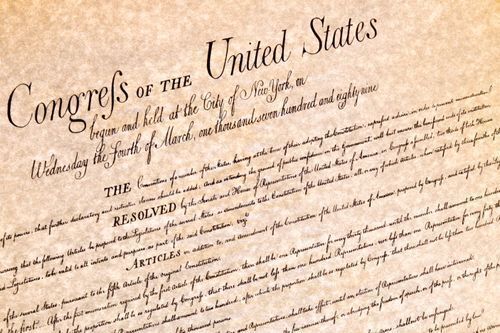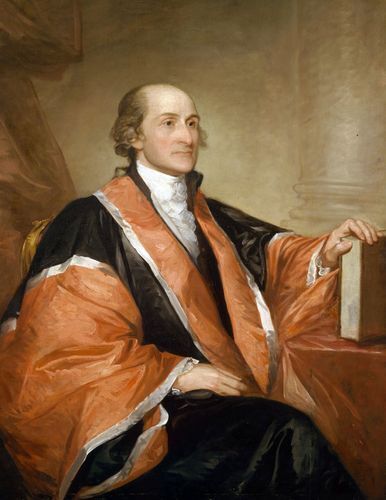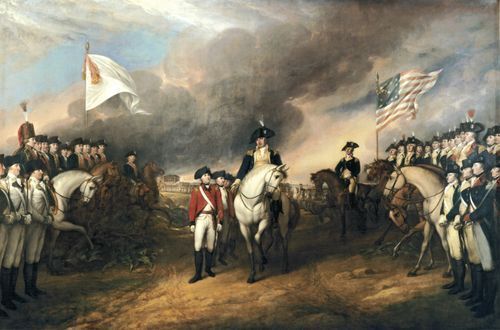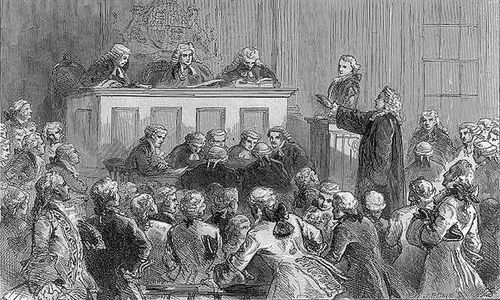Jury Rights Are the Biggest Deal on Bill of Rights Day
by Kirsten C. Tynan

On 15 December 1791, what are now the first ten amendments to the U.S. Constitution were fully ratified by Virginia. With Virginia as the tenth of fourteen states needed to approve them, the Bill of Rights was itself ratified. That is why we celebrate Bill of Rights Day each year on 15 December.
When we do that, let's make sure we fully appreciate how truly protected jury rights are in the Bill Rights. No other rights are addressed directly in the Bill of Rights, and they are even more extensively covered when you consider indirect provisions that also support or include them.
Sixth Amendment
When people think of the right to trial by jury in the Constitution, the first thing they will frequently think of is the Sixth Amendment:
Amendment VI
In all criminal prosecutions, the accused shall enjoy the right to a speedy and public trial, by an impartial jury of the State and district wherein the crime shall have been committed, which district shall have been previously ascertained by law, and to be informed of the nature and cause of the accusation; to be confronted with the witnesses against him; to have compulsory process for obtaining witnesses in his favor, and to have the Assistance of Counsel for his defence.
(It's worth noting that the right to trial by jury was so important to the founders that it was codified in the United States Constitution years before the Sixth Amendment was ratified in Article 3, Section 2 of the body of Constitution itself.)
This Amendment makes some pretty specific guarantees:
- trial by jury in "all" criminal prosecutions
- speedy trial
- public trial
- an impartial jury
- the jury drawn from the state and district where the accused is alleged to have committed the crime
But inherent in the concept of trial by jury itself, and intended to be included in the guarantee of the right to trial by jury itself, were some other elements. Among them were expectations that:
- a jury would be composed of twelve people
- a conviction required unanimous agreement by all jurors
- jurors would not punished for or unduly impeded from exercising their right to vote not guilty for any reason they believe is just, even if the law was proven to have been broken
Fifth Amendment
While criminal trial by jury is codified in the Sixth Amendment, it is in the same neighborhood with the Fifth Amendment requiring grand juries for certain indictments and the prohibition against double jeopardy:
Amendment V
No person shall be held to answer for a capital, or otherwise infamous crime, unless on a presentment or indictment of a Grand Jury, except in cases arising in the land or naval forces, or in the Militia, when in actual service in time of War or public danger; nor shall any person be subject for the same offence to be twice put in jeopardy of life or limb; nor shall be compelled in any criminal case to be a witness against himself, nor be deprived of life, liberty, or property, without due process of law; nor shall private property be taken for public use, without just compensation.
Both these provisions supported the founders' vision of juries who stood as a bulwark against tyranny by judging the law as well as the facts in cases before them, and by refusing to do government's dirty work when it was trying to enforce unjust laws or unjustly apply generally good laws in ways they weren't intended to be used.
Grand juries in American history, for example, on various occasions refused to indict people accused of besmirching the government's reputation by publicizing its misdeeds or resisting taxes they found unjust. And the prohibition against double jeopardy was meant to make a jury's decision to find someone not guilty final such that the government could not circumvent it even if the acquittal was due to jury nullification.

Seventh Amendment
The right to trial by jury in civil matters worth over $20 is also grouped together with these:
Amendment VII
In Suits at common law, where the value in controversy shall exceed twenty dollars, the right of trial by jury shall be preserved, and no fact tried by a jury, shall be otherwise re-examined in any Court of the United States, than according to the rules of the common law.
Though our focus tends to be more on criminal trial by jury, and related to that, grand juries, trial by jury in civil cases ought not to be forgotten.
Keep in mind that the charge to the jury, given by John Jay, first Chief Justice of the United States Supreme Court, in the case of Georgia v. Brailsford (1794):
It may not be amiss, here, Gentlemen, to remind you of the good old rule that on questions of fact, it is the province of the jury; on questions of law it is the province of the court to decide. But it must be observed that by the same law which recognizes this reasonable distribution of jurisdiction, you have nevertheless a right to take upon yourselves to judge of both, and to determine the law as well as the fact in controversy. On this and on every other occasion, however, we have no doubt you will pay that respect which is due to the opinion of the court: for, as on the one hand, it is presumed, that juries are the best judges of facts, it is, on the other hand, presumable that the court is the best judge of law. But still both objects are lawfully, within your power of decision.
This was a civil trial by jury. In dispute was an unpaid debt incurred by a Georgia citizen before the American revolution which a British subject tried to collect after the war ended. Jay's instructions to the jury in this case remind us that jury nullification applies not only to criminal trials by jury, but civil jury trials as well.

Ninth and Tenth Amendments
Those might be the only three amendments that come to mind when you think of jury rights in the Bill of Rights. But wait! Jury rights are actually guaranteed in HALF of the amendments that make up the Bill of Rights. Let us not forget the last two:
Amendment IX
The enumeration in the Constitution, of certain rights, shall not be construed to deny or disparage others retained by the people.
Amendment X
The powers not delegated to the United States by the Constitution, nor prohibited by it to the States, are reserved to the States respectively, or to the people.
The word "jury" never appears specifically in these amendments, but they were intended to protect rights that existed at the time the document was adopted without listing them all individually. Former Washington state Supreme Court Justice William Goodloe pointed out in Jury Nullification: Empowering the Jury As the Fourth Branch of Government that:
It should also be noted that trial by jury and jury nullification were common law rights at the time of the drafting of the Constitution and so are also included as “rights retained” by the people under the Ninth Amendment. And since jury nullification is both a right and a power that the people were exercising at the time the Bill of Rights was adopted it is therefore also a power reserved to the people by the Tenth Amendment.

First Amendment
Not only are jury rights, including the right of jurors to show lenity in their verdicts, codified in the Bill of Rights, but it ALSO codifies rights that trace back to key cases of jury independence.
First Amendment
Congress shall make no law respecting an establishment of religion, or prohibiting the free exercise thereof; or abridging the freedom of speech, or of the press; or the right of the people peaceably to assemble, and to petition the Government for a redress of grievances.
Let's go through the list:
Freedom of Religion, Speech, and to Peaceably Assemble
In the 1670, jurors refused to convict William Penn for preaching the Quaker religion in Gracechurch Street in violation of a law prohibiting religious assemblies, other than those for the state-established Church of England, of more than five people. Though several of the jurors were held in prison for a few days, without food, water, tobacco, or fire, to induce them to convict, they held their ground and maintained their not guilty votes.
Freedom of Religion, Speech, and the Right to Petition the Government
In 1687 and 1688, England's last Catholic monarch, James II, issued a Declaration of Indulgence loosening penalties for religious non-conformity with the state-sanctioned Church of England and extending religious toleration to those of other faiths. One way it did this was by ending the requirement which made passing certain religious tests showing loyalty to the Church of England a prerequisite for government employment. It was generally not well-received for a variety of reasons, including that James II was encroaching on the authority of Parliament by effectively abolishing the Test Act that imposed such religious tests.
James II then ordered that the Declaration be read aloud in every church—something to which the Archbishop of Canterbury and several other bishops of the Church of England took great exception. Seven of these bishops signed a petition requesting exemptions from the order. This enraged James II, who then put them on trial for seditious libel. The jury acquitted them all.
Freedom of the Press
In 1736, newspaper printer John Peter Zenger was tried for seditious libel for printing information in The New-York Weekly Journal scathingly critical of the colonial governor specifically and government more generally. At that time, the truth of the statements was no legal defense against charges of libel. Despite the judge's attempts to impede his efforts, Zenger's attorney Andrew Hamilton spoke openly in front of the jury about their right to judge the law as well as the facts in the case and to vote their conscience despite any instructions to the contrary. The jurors found Zenger not guilty.
That jury rights are arguably THE most protected rights in the Bill of Rights makes sense, of course, because denial of the benefits of trial by jury was among the grievances listed in the Declaration of Independence that led the founders to pursue independence from England. They literally fought a revolutionary war, in no small part, to secure jury rights. Moreover, they recognized that many of the liberties they intended to secure for themselves would constantly be under threat by the government without independent oversight by those subject to the law.
We in the FIJA family believe that they are still worth fighting for today. Through our educational efforts, we fight to restore to common public knowledge and legal recognition jurors' right to judge the law as well as the facts in cases before them and to show mercy when they believe it is just by declining to enforce the letter of the law as government dictates it to them, even if the accused has been proved guilty beyond reasonable doubt.
-
Estimated Convictions Obtained by Plea Bargain
97%
-
Extra Punishment for Refusing a Plea Deal
64%
-
Rank of U.S. in Incarceration
1
-
Years FIJA Has Fought for Jury Rights
36


